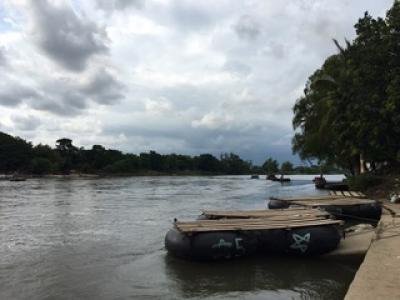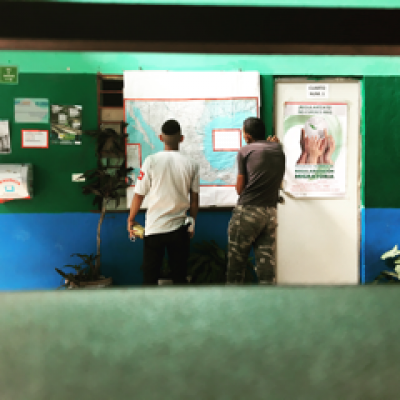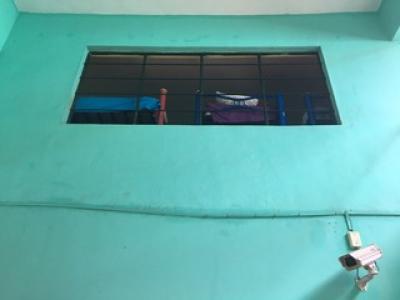Transnational Policing, Migration Control, and the Gendered Persecution of Central America’s Youth
Posted:
Time to read:
Guest post by Kaelyn DeVries. Kaelyn holds a master’s degree in International Security from the Josef Korbel School of International Studies at the University of Denver. She has investigated security issues in Central America over several years and seeks to call out and challenge state-driven violence via punitive security policies which disproportionately target marginalized communities.
In November 2016, the Salvadoran online newspaper El Faro posted a photo and short story of a young boy who, at thirteen, was forcibly recruited into a gang and made to collect extortion fees against his will. Yet he failed to collect the money as he spent most of his time in hiding, convinced that if the police found him, they would murder him. Following his arrest on charges of extortion, he faced a prison sentence of up to fifteen years. One of the online responses to the anecdote read: ‘Good, that piece of shit…’
In northern Central America – El Salvador, Honduras, and Guatemala – compassion for young people in situations like the one described above is scarce. Their profound criminalization permeates society such that their lives are stripped of intrinsic value and their deaths at the hands of state military and police forces are justified in the name of ‘security’.

Central American migration is not a new phenomenon. Given an intricate web of socioeconomic, political, and structural issues, Central Americans have travelled in caravans seeking protection in foreign territories for decades following sustained U.S. political, economic, and military intervention in the region. Today, U.S. hegemony over the region manifests itself in security programs such as the Alliance for Prosperity, which supports arming and training Central America’s deadly security forces, and Programa Frontera Sur, which militarizes Mexico’s southern border with Guatemala in order to detect, detain and deport migrants. Neither initiative has contributed significantly to decreasing migration, and both have been linked to an increase in violence and human rights violations against Central American citizens at home and as they migrate.
Meanwhile, in response to the recent spikes in migration from northern Central America, Donald Trump spewed anti-immigrant rhetoric and spread false propaganda about Central American asylum-seekers, particularly young men. He described massive crowds full of ‘young, strong men’ making their way to U.S. territory, and called on Congress to secure the southern border against an alleged swell of ‘gang members and other criminals’.
Trump’s rhetoric, though no less troubling, is indicative of a larger pattern in contemporary security policy and migration control: the global diffusion over the last several decades of politicized philosophies around crime, criminality, and control of ostensibly ‘out of control’ populations. The political subjectivities in this context claim that youth of marginalized ethnic groups and socioeconomic classes are innately criminal and deserve punishment rather than protection. Media outlets propagate fears around violent youth imaginaries: the gangbanger, the thug, the criminal alien. Youth who ‘fit this profile’ are excluded from opportunities for positive development or economic productivity. Politicians then call for surveilling and policing their neighborhoods and promote prison as a solution to their deviance. In northern Central America, these prejudices translate into policies that prop up a violent security apparatus which kills young people, especially young men, every single day.
Since the early 2000s, for instance, governments across Central America have implemented mano dura (iron fist) security policies, derived from the zero tolerance crime policies that ravaged marginalized U.S. communities in the late 90s. Data from northern Central America show that mano dura complicated the battle between police and youth street gangs, as instances of profiling, abuse, and youth arrests leading to disappearances by police skyrocketed.


Make no mistake, the killing of marginalized youth in northern Central America and beyond is political: it is purposeful, and it is state-driven. As a nation with deep-seated ties to the origins and continued growth of violence in the region, we must stop devaluing their lives and instead seek their protection at all costs. If we don’t, we will continue to be complicit in their erasure.
Any comments about this post? Get in touch with us! Send us an email, or post a comment here or on Facebook. You can also tweet us.
__________
How to cite this blog post (Harvard style)
DeVries, K. (2019) Transnational Policing, Migration Control, and the Gendered Persecution of Central America’s Youth. Available at: https://www.law.ox.ac.uk/research-subject-groups/centre-criminology/centreborder-criminologies/blog/2019/04/transnational (Accessed [date])
Share:








